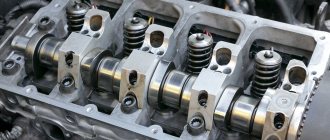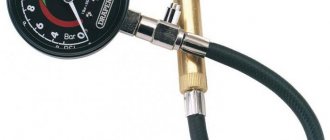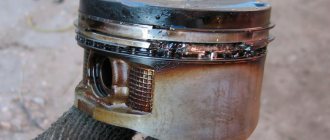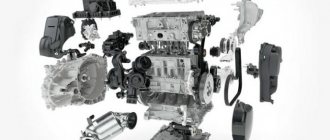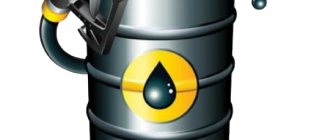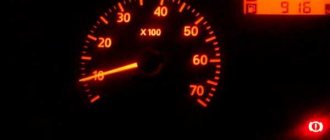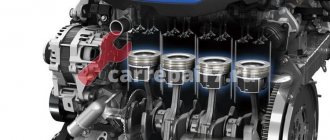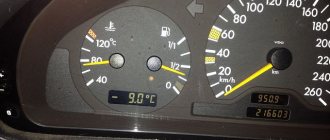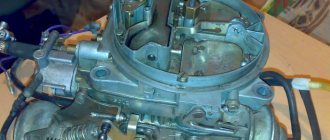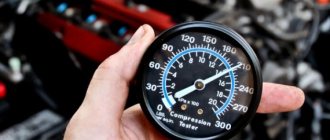Causes of popping
The main reason for popping noises in the muffler when releasing gas in injection or carburetor systems is unburned fuel. It enters the exhaust system, where it ignites, hence the loud noise, like a bang. It is fair to say that the louder the popping sound is, the more fuel has leaked from the system. Sometimes it happens that several “shots” occur in a row. This situation should absolutely not be allowed to happen. It is worth noting that popping noises in the muffler when releasing gas on an injection-type engine, as well as on a gasoline engine, is only a consequence. To get rid of the defect, it is necessary to understand how the fuel got into the exhaust system and solve this particular defect.
As for the malfunctions due to which this can happen, this can include a problem with the carburetor or injector itself, timing belt defects, or ignition systems. If we are talking about an injection type engine, then the failure of various sensors can be added to the breakdown.
It is worth noting that popping noises may occur in the muffler when releasing gas from the injection system, as well as when over-gasping or while the engine is idling. In addition to the characteristic popping sound, a large amount of smoke will come out of the chimney immediately after this. In addition to these two obvious signs, there are several others that indicate the presence of such a malfunction. These include loss of engine power, floating idle speed, as well as increased fuel consumption.
Let's analyze situations for different cars
Now let’s look at the causes of the malfunction in relation to certain car models:
And other representatives of the domestic automobile industry are susceptible to the appearance of shots in the muffler. A common cause is a misconfiguration in the ignition system.
The spark fires, but with a delay, at the moment the exhaust valve opens, and not at the moment of greatest compression.
The result is that part of the combustible mixture ends up in the manifold.
The reasons may be the following:
If shots in the muffler appear when the gas is pressed in VAZ 2106 and VAZ 2109 cars (at low speeds), the cause may be a violation of the valve clearance.
In its absence, part of the fuel ends up in the collector, and the consequences in question become inevitable. The solution to the problem is to replace the valves or adjust them.
Air filter as the cause of the problem
One of the reasons that can cause popping noises in the muffler when releasing gas is an incorrectly formed fuel mixture. To form it, only two components are used - gasoline and a small amount of air. The latter enters the system through a system of tubes, at the inlet of which there is an air filter. If this part becomes clogged, then it is not able to pass the required amount of air through itself, and therefore the engine begins to suffer from “oxygen starvation”. Naturally, because of this, it is not possible to completely burn the fuel, and therefore it enters the manifold, from where it flows into the exhaust gas system, creating pops in the muffler when gas is released. The popping noise itself occurs due to the fact that the fuel in the muffler heats up and subsequently explodes.
As for fixing the problem described, it is quite simple. It is necessary to check the air filter located at the entrance to the system. It cannot be cleaned, and therefore, if it is clogged enough, you just need to replace it with a new one. The problem is the easiest to fix. It occurs most often in cases where the filter has not been changed for some time after it was required to be done according to the regulations. In this case, popping noises in the muffler are most easily eliminated.
Causes of gas pop
The occurrence of popping noises when working on gas can have different manifestations. Below we will look at the most common reasons.
Lean mixture (causes of occurrence)
In most cases, the reason lies in a lean gas mixture. A lean mixture is an excessive excess of air over gas. As a result, such a mixture may not ignite the first time. This is what causes the cotton to pop. The main causes of a lean mixture may be:
- gas supply transmitted by the dispenser,
- dirty gas filter,
- air leak in the system.
Armored wires
A fairly common problem on cars that have traveled more than tens of thousands of kilometers. If the wire insulation is damaged, the current may not be sufficient to produce a spark at the spark plug. As a result, the candle does not ignite the mixture the first time, and cotton is formed.
Diagnosing a problem with armored wires is quite simple. It is necessary to open the hood at night, in complete darkness, and carefully inspect the engine compartment. If the problem is in the high-voltage wires, from time to time a “glow” of the wire will be visible under the hood.
Candles
Plugs, or more precisely, an incorrectly set gap in the spark plugs, can cause gas popping during LPG operation. This happens due to untimely ignition of the gas-air mixture in the cylinders. As a result, fuel ignition occurs on the return path of the valve or does not occur at all. In the latter case, this leads to the formation of an unburnt mixture.
Ignition coil
The ignition coil is also quite capable of causing unstable operation of the entire system. This unit can only be diagnosed by replacing it with a previously serviceable one. But the problem with the coil will appear not only when the car is running on gas.
Gearbox
Incorrect settings or untimely maintenance of the gearbox can lead to unstable operation of the entire gas equipment. Read about how exactly to carry out maintenance in this article.
You should also pay attention to the installation of the gearbox. Look how far the gearbox is from the intake. A tube that is too long can also contribute to what causes the gas to pop.
Carburetor and pops
Quite often it happens that popping noises in the exhaust system begin due to the fact that the carburetor was incorrectly configured. Its job is to create the correct fuel-air mixture, which is then supplied to the engine. If it happens that after adjusting it, it saturates the mixture too much with fuel, that is, gasoline, then the same thing as described above will begin to happen. That is, popping noises will begin to occur in the muffler when gas is released from the carburetor system. Naturally, the only correct way out in such a situation would be to reconfigure this element.
The first thing to do in this case is to check the gasoline level in the chamber in which the special float is located. It is important to know here that each carburetor is adjusted individually, and therefore each has its own optimal level. However, there is one common feature: if you remove the cover, the float should be flush with the level of the cover. If this is not the case, then you need to make adjustments. In addition, you should immediately check the integrity of the float itself. If it has any deformations, this can lead to fuel getting inside it, and therefore it indicates the wrong gasoline level.
Another reason for popping noises in the muffler is the system jets. They may also be incorrectly configured or, if they have been in use for a long time, become dirty. In this case, the same thing will happen as happened with a dirty air filter. Jets are the same as air filters, with the only difference being that they are used in a carburetor system to create a mixture, and not in an injection system. Their clogging means that the amount of air entering the chamber decreases, and therefore the mixture becomes oversaturated with gasoline. Quite often, popping noises in the muffler at idle speeds occur after a sharp transition has been made from such speeds to higher speeds. In addition, the cause may be a sharp increase in speed, that is, excessive acceleration. If after any of these actions popping sounds appear, then you need to check the carburetor.
Why does the silencer shoot: problems and their solutions
- Shoots because of the air filter
- Checking the carburetor and solving the problem
- Late ignition. Checking and fixing the problem
- Incorrect thermal clearance
- Irregularities in the timing phases: definition
- If the car is of injection type
Popping noises in the exhaust system are a sign of a car engine failure. In the case of carburetor cars, breakdowns are more common. It is associated with an incorrectly set ignition or flaws in the operation of the gas distribution mechanism. In this article we will look at why the muffler shoots.
Popping sounds due to a problem with the ignition system
Popping noises in the muffler at idle or during normal operation can also be heard due to the fact that the ignition system was incorrectly configured. Most often, popping noises at idle, as well as at high speeds, are due to the fact that the ignition is too late. This is explained as follows. The moment the spark appears occurs when the supply valve has already fully opened. Because of this, some of the fuel manages to leak into the manifold, from where it flows into the exhaust system. If the ignition is, for example, too early, then there will still be “shots”, but they will occur in the air filter, and not in the exhaust pipe. In addition, popping noises in the muffler when pressing the gas, if they occur due to late ignition, are also dangerous because the intake valve may burn out over time. For these two reasons, it is necessary to repair such a breakdown very quickly.
Another reason that lies in the ignition system is spark plugs. The spark may be too weak, causing the fuel to not burn completely again. This may happen for the following reasons:
- There may be poor contact on high-voltage wires. To exclude this, firstly, you need to check, and, secondly, clean if necessary. In addition, you should check for the absence of such a defect as breaking through to ground.
- Another reason is a malfunction in the operation of a part such as a distributor. It should be checked anyway.
- The spark plugs themselves can fail. If this happens to at least one of them, then this will greatly affect the power of the spark that it produces, and therefore the combustion of fuel.
If the cause of the popping noise in the muffler was precisely the faulty spark plugs, then they need to be replaced, but only with those that have a suitable heat rating. Only in this case will the necessary power be provided to create a spark.
shoots into the air filter and does not go
- Answer
#1 ROMACHA
You can only breathe in the wind
- Club users
- Messages: 3,272
- City: Moscow JSC Mozhaisky
- Interests: Stalker
- Car: Opel
- @Mention
The situation is this, not always, but it happens that after starting, when trying to drive, the car turns on stupid, when trying to accelerate, it develops poorly and sometimes shoots at the air. After a while everything becomes normal and you can drive like this all day. And if you give it a decent amount of gas in the parking lot, the revs begin to float and the car seems to accelerate on its own, somewhere up to 1.5 thousand, if you hit the gas pedal a little, then the revs return to normal, if you don’t do this, then everything is smooth. Those didn’t show anything, i.e. everything is fine, the check does not light up, and this happens every day. The last time this happened was when I was returning from the south and it happened on the road, the car simply stalled, and when I tried to press the gas harder it shot into the air filter.
The first time I noticed this was a long time ago when I changed the engine temperature sensor, but somehow it only happened once, and then it didn’t appear again until recently.
Please tell me where the legs can grow, of course there may be a sea of options, but what if anyone has encountered something similar.
- Top
- Answer
- Quote
#2 Unc
Notu konnektukedo (Dima)
- City: Russia, Moscow
- Car: OOB X25XE'97 SPORT manual transmission 205/65/15 x462xx
- @Mention
- Top
- Answer
- Quote
#3 ROMAHA
You can only breathe in the wind
- City: Moscow JSC Mozhaisky
- Interests: Stalker
- Car: Opel
- @Mention
- Top
- Answer
- Quote
#4 PILOT-T
Experienced Opel Driver
- City: Ukraine. Nikolaev.
- Car: OOB 1JZ GTE VVTI Restyle, OVA C18NZ 4WD
- @Mention
The situation is this, not always, but it happens that after starting, when trying to drive, the car turns on stupid, when trying to accelerate, it develops poorly and sometimes shoots at the air.
The last time this happened was when I was returning from the south and it happened on the road, the car simply stalled, and when I tried to press the gas harder it shot into the air filter.
The first time I noticed this was a long time ago when I changed the engine temperature sensor, but somehow it only happened once, and then it didn’t appear again until recently.
Please tell me where the legs can grow, of course there may be a sea of options, but what if anyone has encountered something similar.
- Top
- Answer
- Quote
#5 Kobra (Whitesnake)
Experienced Opel Driver
- City: Moscow, VAO, Perovo
- Car: Chevrolet Captiva '2012, C140 2.2 turbodiesel, AT, 184 ls, configuration LTZ
- @Mention
Lambda is unlikely. If it were dead, Tech would show an error on it and the “throw out the engine” (check) light would come on on the dash.
- Top
- Answer
- Quote
#6 ROMAHA
You can only breathe in the wind
- City: Moscow JSC Mozhaisky
- Interests: Stalker
- Car: Opel
- @Mention
In general, today I measured the pressure in the fuel rail, at idle it is 2.7 when pressing the gas 2.4, and we also pressed some vacuum valve on the rail and then the pressure increased to almost 4 (about 3.7) (what kind of valve is this and what is it responsible for?). After this procedure, if the car sits for a long time, you have to turn it for a long time to start it. I didn’t notice any other bugs today. On the technical side, both lambdas work normally and quickly, the temperature sensor on the ECU shows the same as the tidy (it’s a new (possibly defective) original), the injectors were washed with Vinz about 10 thousand ago. These are the pies.
We also removed the cap from the fuel rail fitting. If anyone has an extra one, please help me, or what can I replace it with (can I just plug it?)
- Top
- Answer
- Quote
#7 Kobra (Whitesnake)
Experienced Opel Driver
- City: Moscow, VAO, Perovo
- Car: Chevrolet Captiva '2012, C140 2.2 turbodiesel, AT, 184 ls, configuration LTZ
- @Mention
In general, today I measured the pressure in the fuel rail, at idle it is 2.7 when pressing the gas 2.4, and we also pressed some vacuum valve on the rail and then the pressure increased to almost 4 (about 3.7) (what kind of valve is this and what is it responsible for). After this procedure, if the car sits for a long time, you have to turn it for a long time to start it. I didn’t notice any other bugs today. On the technical side, both lambdas work normally and quickly, the temperature sensor on the ECU shows the same as the tidy (it’s a new (possibly defective) original), the injectors were washed with Vinz about 10 thousand ago. These are the pies.
We also removed the cap from the fuel rail fitting.
Rum, do you have two lambdas? I have four of them - two front and two rear. I could be wrong about the pressure (let competent people correct me if I messed up), but when the “pressure gauge” was connected to the open circuit (I have two hoses going to the left side of the engine - they removed one and “stuck the device” into the gap) - the pressure at idle, I don’t remember exactly It should be either 4 or 6 (that’s what happened to me, but the needle moved slightly, and when I pressed the gas it dropped to 1, but it should drop no lower than 2.5). As a result, the benzik was “sentenced.” When it was removed, the entire mesh was clogged and black. Of course I don't care. (I'm no expert), but in my opinion the difference should be greater than in your case. Once again I ask you not to kick me if someone said something wrong.
- Top
- Answer
- Quote
Thermal gap as the cause of all problems
First you need to understand what the thermal gap itself is. This is the distance by which individual parts of the engine can increase in volume when they are heated. Most often it can be found between elements such as valve lifters, as well as camshaft cams. An incorrectly set thermal gap may be one of the reasons why popping noises occur in the muffler on gas.
Indirect, but still evidence that the gap is too large, can be two factors. The first of them is a decrease in engine power, and the second is increased noise during its operation. If the gap is too small, it will cause gas to shoot out in the exhaust pipe. This happens for a completely understandable reason - a not completely closed valve will allow a small amount of gasoline to pass into the manifold, from where it flows into the exhaust gas system.
Naturally, the thermal clearance of the cylinder head can be adjusted. You will have to manually adjust the valve on each cylinder, and this can only be done on a cold engine.
The influence of thermal clearance on popping noises in the engine
When malfunctions occur in the engine and the first explosions in the muffler, car owners test the car under various loads.
Thus, the appearance of popping noises at any speed (high, medium and low) may indicate failures in adjusting the thermal clearance of the cylinder head valves.
The solution is to disassemble the motor and use a tuning tool. After performing the check, you can draw conclusions about the causes of the problem.
The camshaft cams and tappets should have a small gap where they touch the valve stem.
Timing problems
Popping sounds in a muffler whose engine operates with a faulty gas distribution mechanism (GRM) are inevitable. As for the problems that precede timing failure and further firing, they are somewhat similar to those that occur with an incorrectly configured ignition system.
In other words, the exhaust valve will open at a time when the gasoline has not yet completely burned. Naturally, unburned fuel will flow into the exhaust gas system, which will lead to the already familiar pops.
There are several reasons that can occur in the timing system, leading to the following consequences:
- A fairly common and first thing to check is timing belt wear. This problem can be identified by additional metallic popping or increased noise when the engine is running at low speed. If this happens, there are two options for troubleshooting. The first is to completely replace the belt, the second is to tighten it if it is loose but not worn out.
- It happens that when checking the timing system, wear of the toothed pulley is detected. It will not be possible to repair it in any way, and therefore you just need to replace it with a new one.
- Another reason is partial failure of the valves. Over time, they become covered with soot. This process is significantly accelerated if you fill the car with low-quality fuel. Naturally, this will lead to a decrease in the efficiency of the mechanism. The valve springs may become stuck, causing the engine to overheat. They need to be replaced if this happens. It may also be that scratches are found on the surface of the valves, which means they need to be sanded. If there are bends or roughness on the surface, grinding needs to be done.
It is also worth mentioning that popping noises in the muffler of VAZ cars and others that use a timing belt for operation are heard only when the engine is warm. If it's cold, there won't be any. This is also one of the proofs that the problem lies in the gas distribution mechanism.
Popping sounds of injection engines
Popping noises when releasing gas from the muffler in carburetor engines occur more often than in injection engines, as practice shows. However, the injection system is still susceptible to this defect. It is worth noting that there are separate reasons for the occurrence of pops in the injection system.
In such cars, the engine's operation is controlled by the ECU, which controls based on a large amount of information received from various sensors. Naturally, false information from any of the sensors will lead to incorrect functioning of the entire system. For example, if false information is received from the air intake sensor, this will lead to an incorrect composition of the fuel-air mixture, as with carburetor engines. The problem will be the same, but its cause is slightly different.
Why can popping noises in the muffler occur in injection systems? This may be due to incorrect crankshaft operation. The position of the sensor of this part should be checked. If this device provides information about a displacement of one tooth, this will also lead to malfunction. In addition to these elements, the cause may be a “glitch” of the throttle or Hall position sensor, as well as some other elements.
The first thing that needs to be done when popping noises in the muffler begin during reset, idling and increasing speed is to conduct computer diagnostics if the car is equipped with an injection system. Such diagnostics should reveal which specific sensor or other element the breakdown occurred with. In addition, it is worth checking the injector itself using the same computer diagnostics.
Other reasons
There are a number of other reasons why a characteristic “shot” in the exhaust pipe may occur:
- The engine idling noise can occur due to two additional reasons. The first of them is a violation of the tightness of the intake manifold. The second is that the idle system itself is clogged.
- Low-quality gasoline or fuel with a low octane number can cause popping noises. It is best to refuel at reputable gas stations.
- Mixed spark plug wires. When replacing, checking or installing spark plugs, it may happen that the connected wires are mixed up. This may well be the cause of popping noises in the muffler. A characteristic feature of this particular problem is not only the “shot”, but also the fact that the car will not start at all.
- People who have an economizer installed in their system often encounter this problem. If it is available, then it is worth checking it.
- In some cases, popping noises in the exhaust pipe are caused by a malfunction of the air damper. If so, then it needs to be adjusted.
- If popping noises occur only when releasing gas, then there is a separate reason for this, which lies in the fact that the exhaust pipe of the muffler (or simply “pants”) is poorly screwed to the exhaust manifold. It is necessary to check the tightness of this connection and, if necessary, seal it, tighten it, etc.
- Another common cause is that the fuel injectors are too efficient. Drivers often say in such cases that they are “flowing.” In this case, they simply supply too much gasoline at once, which is why, even with normal spark power, it does not have time to burn before the exhaust valve opens. Therefore, fuel seeps into the pipe where the popping occurs. There is an easy way to check this defect. At high engine speeds and with the gas pedal pressed, try to start it (the so-called purge mode). If a popping noise occurs at these moments, then at least one of the injectors is leaking.
- As for other reasons for injection systems, there is such an issue as knock sensor fatigue, due to which ignition may occur too late. In addition, it may not respond correctly to extraneous noise occurring in the engine. Its performance can only be checked using computer diagnostics.
Causes of gas pop
The occurrence of popping noises when working on gas can have different manifestations. Below we will look at the most common reasons.
Lean mixture (causes of occurrence)
In most cases, the reason lies in a lean gas mixture. A lean mixture is an excessive excess of air over gas. As a result, such a mixture may not ignite the first time. This is what causes the cotton to pop. The main causes of a lean mixture may be:
- gas supply transmitted by the dispenser,
- dirty gas filter,
- air leak in the system.
Armored wires
A fairly common problem on cars that have traveled more than tens of thousands of kilometers. If the wire insulation is damaged, the current may not be sufficient to produce a spark at the spark plug. As a result, the candle does not ignite the mixture the first time, and cotton is formed.
Diagnosing a problem with armored wires is quite simple. It is necessary to open the hood at night, in complete darkness, and carefully inspect the engine compartment. If the problem is in the high-voltage wires, from time to time a “glow” of the wire will be visible under the hood.
Candles
Plugs, or more precisely, an incorrectly set gap in the spark plugs, can cause gas popping during LPG operation. This happens due to untimely ignition of the gas-air mixture in the cylinders. As a result, fuel ignition occurs on the return path of the valve or does not occur at all. In the latter case, this leads to the formation of an unburnt mixture.
Ignition coil
The ignition coil is also quite capable of causing unstable operation of the entire system. This unit can only be diagnosed by replacing it with a previously serviceable one. But the problem with the coil will appear not only when the car is running on gas.
Gearbox
Incorrect settings or untimely maintenance of the gearbox can lead to unstable operation of the entire gas equipment. Read about how exactly to carry out maintenance in this article.
You should also pay attention to the installation of the gearbox. Look how far the gearbox is from the intake. A tube that is too long can also contribute to what causes the gas to pop.
Claps with gas equipment
It is worth saying that this problem is also present in cars that use liquefied gas as fuel.
The cause of popping noises may be insufficient and unstable gas supply. Most often this is done either due to incorrect settings of the gas reducer or due to a clogged air filter. The reasons are similar to gasoline engines. The solution to the problems is also similar, that is, you need to either change the filter or reconfigure the gearbox. If gas is used as fuel, and the engine itself is injection, then the problem may be in the mass air flow sensor (MAF).
Incorrect ignition angle can also cause the popping sound. Here, in principle, the problem will be similar to that described earlier in a gasoline engine. With late ignition, cotton will be in the muffler, with early ignition - in the air filter.
Popping sounds on a car with 2-4 generation HBO on the injector and carburetor (reasons, solutions)
Last updated April 2, 2021 at 12:29 pm
One of the malfunctions of cars with a gas system is popping noises in the intake manifold or muffler. Most often, carburetor and injection cars with 2nd generation gas equipment suffer from such failures.
On cars with 4th generation HBO, the occurrence of such a problem is structurally excluded, but failures also occur.
In this article we will look at the causes of popping noises, as well as ways to troubleshoot and troubleshoot.
Conclusion
At the end, it is worth summing up all of the above. Firstly, popping noises in the muffler are a non-critical problem, but quite unpleasant, and it’s worth addressing it as quickly as possible. Secondly, in addition to external sound factors, there are also internal ones, which lie in the fact that the engine and gas exhaust systems will deteriorate. In addition, slamming means excessive consumption of fuel, which means an increase in the cost of purchasing it. When a car is used for a long time with such a problem, certain parts may burn out, which will completely disable the car and require more money and time for repairs. Popping noises in the muffler on an injection engine may not be eliminated without diagnostics.

